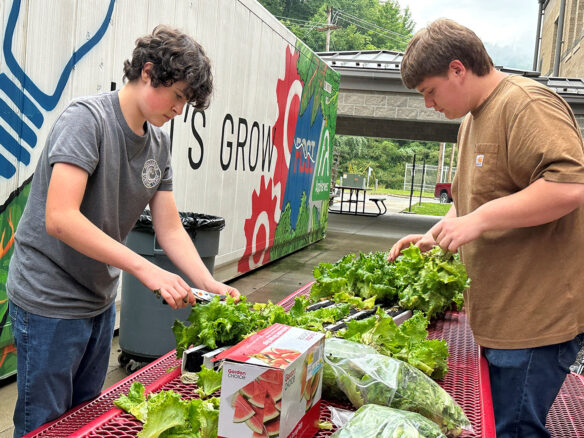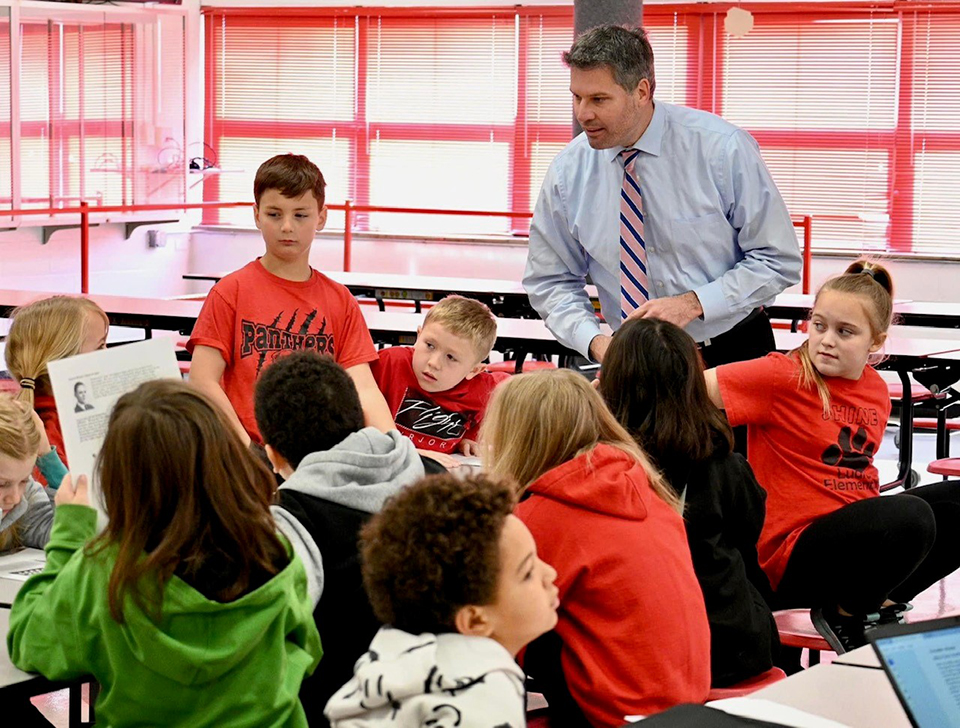
Growing plants in the Floyd County container farm teaches students important lessons about agriculture, including optimal environmental conditions for plant life. The lessons also extend into focusing on entrepreneurship, leadership development and responsibility.
Photo by Toni Konz Tatman, Kentucky Department of Education
MARTIN, KY – Resting on a hill overlooking the town of Martin, the Floyd County School of Innovation (FCSI) provides students with career and technical education (CTE) experiences. When it opened its doors in 2020, it became a beacon of opportunity for computer science, engineering, healthcare and, as of 2021, agriculture education.
The district decided to purchase a container farm as it developed its agriculture program. Container farms are complete growing systems in large boxes – freight containers – that centralize the growing process for educators. The centralized, versatile environment provided by the container farm propelled it beyond other options.
The container farm now rests on the FCSI campus, a collaborative effort between Floyd County schools and Freight Farms. Freight Farms began its operations in 2013 by focusing primarily on urban agriculture, but later expanding to focus on agriculture technology across landscapes. Now, the containers they produce are found in all 50 states and 40 countries.
Denise Isaac, CTE coordinator for the district, said purchasing the container farm came from a desire to expand access to agriculture education in the community. The district aims to build upon agriculture as the Appalachian region it lies in revitalizes its economy.
“We were one of five counties in the state that didn’t have [an] agriculture [program] when we started our pathway. Our students were not aware of all the opportunities agriculture offered,” she said. “It is now the top requested pathway. Vet-tech science, gardening, small animal and large animal sciences, floral arrangement, [there are] tons of new opportunities for our students.”
The funding for the container farm was made possible with the Kentucky Department of Education’s (KDE’s) federal Elementary and Secondary School Emergency Relief (ESSER) funding from the federal American Rescue Plan (ARP) Act, which supports the safe and sustained return to in-person learning after the COVID-19 pandemic and expands equity by supporting students who need it most, particularly those most impacted by the global health event.
Investing in CTE has been a focus of Floyd County Schools in recent years because of its link to school culture, climate improvement and student engagement.
“CTE means every student has a talent and an area they excel in,” Isaac said. “It is our responsibility to introduce the pathway, find what they each offer until our students find the right fit.”
The agriculture program expansion and container farm also provide students with a sense of belonging in a career and technical student organization, as the agriculture curriculum aligns with the National FFA Association, formerly Future Farmers of America.
Floyd County schools hired Justin Smith, an agriculture teacher who was in a neighboring district’s program during high school, to head the effort. Isaac said Smith’s hire continues to increase FSCI’s success.
“Mr. Smith was very involved in agriculture as a high school student and while a student at the University of Kentucky,” Isaac said. “I can’t say enough about Mr. Smith and how he is changing lives.”
Smith said the container farm allows students to learn through hands-on experience.
He explained that the container farm is a large, vertical hydroponic system where students plant seeds in peat moss plugs and allow them to germinate in the seed bed for 10-14 days. Once the seedlings are large enough, students transplant them into vertical grow columns, which hang on a moveable wall. The grow columns have foam to hold plants in place and strips that allow the plants’ roots to soak up water.
“The plants will stay in these vertical grow columns for 5-7 weeks. During this time students are monitoring plant growth, adding nutrients to our water tanks, and checking pH levels,” he said.
Student Kaden Lewis said checking nutrient levels and monitoring plant growth has made him more responsible.
“We … harvest plants and package them in one-pound bags,” Smith said. “The whole process takes about eight weeks from seed to harvest.”
In addition to agriculture lessons, the container farm has allowed students to gain valuable knowledge pertaining to business and entrepreneurship.
“We have been able to sell lettuce to local businesses and hospitals and we donated lettuce during the flooding that happened in our area,” Lewis said.
Student Kaylee Perkins said the lettuce also is consumed by local students.
“The lettuce we grow is sold to our school cafeteria and community, so they have fresh and local food,” she said.
Isaac said Smith is building upon students’ existing knowledge through lived experience across the agriculture pathway.
“Our students farm on small farms and didn’t realize how much they already knew. Kids in eastern Kentucky have most likely assisted family in gardens, taking care of horses, cows, chickens,” she said. “Mr. Smith embraced what the kids had and assisted in developing more of the farm or taking care of what they already have.”
Smith said he believes “the future of agriculture in Floyd County is bright.”
“Working with my students each day shows me that they are passionate about agriculture and FFA,” he said.
Isaac echoed Smith’s sentiments.
“Agriculture has a future in eastern Kentucky. I would love to see our students leading the way with the container farm and all other possibilities,” Isaac said.



Leave A Comment